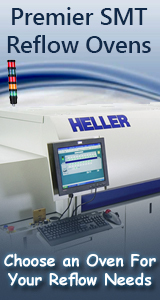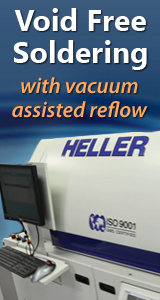John,
We are using a well known solder paste, begining with the letter "H". (I don't want to be accused of advertising). Also, we are now using a board inverter. In the early day's however, before we purchased a board inverter, we were having to lift the board off the conveyor and invert it by hand!! We obviously had to be careful but it helped us proove the process.
We are putting down bread and butter items. 1206's, sot-23's, mini-melf diodes and a couple of 16-pin IC's.
I don't envy you trying to put a QFP down. But, having said that the principles are the same. Yes, it will be heavier than a 16 pin I.C. but just put some extra glue dots down.
One thing to be wary of, we had to increase our placement force on one of the 16-pin Micro's. It's kind of heavy, compared to the other parts, and when we inverted the board, it caused us a slight problem.
If your in the UK, then we could arrange a visit to our factory and see the board in action? Maybe you could bring your board and we can try and bounce some ideas off each other? If your not, but want to talk on the phone, my telephone number is +44 1543 444777.
Regards,
Joe.
@@@@@@@@@@@@@@@@@@@@@@@@@@@@@@@@@@@@@@@@@@@@@@@@@@@@@@@@@@@@@@@@ | Joe.. | | Sound's pretty neat trick..mind if I ask what type of comp's are on this board and the paste..? | This baby (pig I think) has got a 244pin QFP right dam in the middle..!, so if ur flipin it 180 degree's are u using like a piece of Jot in line conveyoring??? | | Dam your got my interest going..now I need to try and do this board...will make me a god dam hero! | | Thanks for the info Joe.. | | John | ----------------------------------------------------------------- | John, | | | | Were doing an intrusive reflow process on a single sided | | board, where all the conventional parts are on the "top" | | of the board. Due to the nature of the board, and the kind | | of componets on it, we couldn't wave solder it. | | | | To keep it contained in the SMD process, we included the | | though hole stuff on the solder paste stencil. After screen printing and placing the board, we invert the board though | | 180 degrees. In otherwords the smd stuff is now on the | | bottom, un-soldered. We are relying on the surface | | tension of the paste. We then hand place 4 parts and reflow | | the board. | | | | One 16 pin IC had a tendancy to drop off in the oven. | | To overcome this, we use our glue dispenser straight | | after the screen print process to put some glue dots | | down so that the part doesn't fall off. | | | | Hope this helps. | | | | Joe. | | | | @@@@@@@@@@@@@@@@@@@@@@@@@@@@@@@@@@@@@@@@@@@@@@@@@@@@@@@@@@@@@@@ | | | | | Folk's, | | | | | | One of my 'fellow' engineer's is brining in a new board that his customer has said shouldn't go over the wave..but he want's us to use intrusive reflow on a connector on the bottom side of the board..so since I was standing in the wrong place at the wrong time ( as per ususal!) I've got the fun job of brining in this new board for the guy..oh the deep joy of it all! | | | Anyway's I've done intrusive reflow already on other card's with pretty good success but never from the bottom. First question I have is..is it possible..? and what about that gravity stuff? | | | My first thought was to laugh and tell the guy to show the customer a great cliff for jumping from but I thought..nah must be possible..or am I barking mad??? | | | | | | help me here guy's hint's or the number of a good clinic is what I need! | | | | | | JohnW | | | | | | | | |
reply »
![]()
![]() Folk's,
One of my 'fellow' engineer's is brining in a n...
- May 20, 1999
by
JohnW
Folk's,
One of my 'fellow' engineer's is brining in a n...
- May 20, 1999
by
JohnW
![]()
![]()
![]() John,
Were doing an intrusive reflow process on a singl...
- May 21, 1999
by
Joe Manzur
John,
Were doing an intrusive reflow process on a singl...
- May 21, 1999
by
Joe Manzur
![]()
![]()
![]() Joe..
Sound's pretty neat trick..mind if I ask what typ...
- May 21, 1999
by
JohnW
Joe..
Sound's pretty neat trick..mind if I ask what typ...
- May 21, 1999
by
JohnW
![]()
![]()
![]() John,
We are using a well known solder paste, begining ...
- May 24, 1999
by
Joe Manzur
John,
We are using a well known solder paste, begining ...
- May 24, 1999
by
Joe Manzur
![]()
![]()
![]() Hello John:
Teka Interconnection Systems offers an a...
- May 24, 1999
by
Hello John:
Teka Interconnection Systems offers an a...
- May 24, 1999
by






